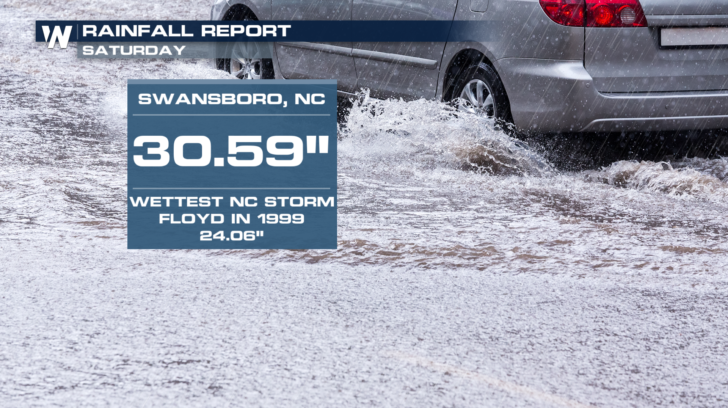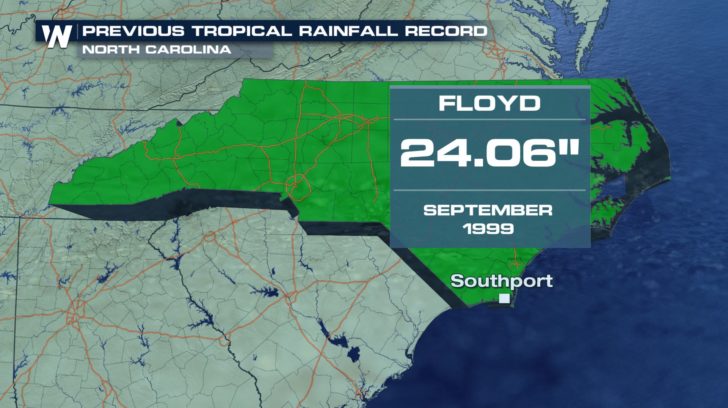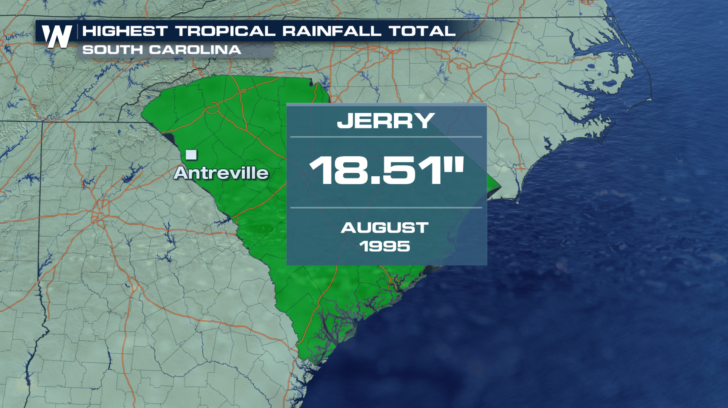More Dangers Loom in the Wake of Florence
Special Stories
15 Sep 2018 9:29 PM
Florence has made history in North Carolina. It has produced record amounts of rain, more than any other tropical system ever to hit the Tar Heel State. Swansboro, NC received over 30 inches of rain from the storm. The previous record in North Carolina was from Hurricane Floyd. Southport, NC received just over 24 inches of rain in 1999.

 By comparison, Tropical Storm Jerry dumped over 18 inches of rain in the South Carolina Upstate back in 1995 to set the record in the Palmetto State. So far, the highest rainfall total in South Carolina from Florence has been a little less than 10 inches in Conway, SC. But those rain totals could certainly rise much higher over the next 24 hours.
By comparison, Tropical Storm Jerry dumped over 18 inches of rain in the South Carolina Upstate back in 1995 to set the record in the Palmetto State. So far, the highest rainfall total in South Carolina from Florence has been a little less than 10 inches in Conway, SC. But those rain totals could certainly rise much higher over the next 24 hours.
 The rain has been causing massive flooding all across the eastern Carolinas. Rivers, creeks, and streams are over-flowing, putting wide tracts of land underwater. We often focus on the human element under such conditions. But there's also a major impact on wildlife. When major flooding occurs, animals are often forced from their natural habitat. Deer, possum, raccoon, and rats are often found into neighborhoods and areas usually occupied by people. The animals are out of their comfort zone, often scared, and can be abnormally aggressive. This can pose serious safety concerns, especially when faced with more dangerous animals such as venomous snakes, or even alligators.
Video shot by Weather Nation Field Correspondent, John Van Pelt, shows a water moccasin on a road, and then swimming away in flood waters when startled. The Carolinas are home to many kinds of snakes, and most aren't poisonous. However, several varieties are poisonous, including the cottonmouth and the copperhead snake. Great care should be taken to avoid them. Many times these snakes are swimming in water or hiding under debris. So please keep a close eye out for them.
https://twitter.com/WeatherNation/status/1041007357319245825
Alligators are usually a little easier to spot. This is particularly true when you see one walking around a neighborhood! Alligators by nature are not typically aggressive. However, when in unfamiliar environments, they can be more easily provoked, And remember, alligators can run faster than humans over short distances. So keep a safe distance, and give them plenty of space.
[playlist type="video" ids="97123"]
On Saturday, we spoke with Weather Nation Field Correspondent, John Van Pelt, reporting from Morehead City, North Carolina. He discussed wildlife being displaced from their natural habit. He also warned about even more dangers that loom in the wake of a big storm like Florence.
https://youtu.be/UF8STqNogQw
So in summary, keep a sharp lookout for dangerous animals displaced from their homes. And never walk into flooded areas. Simply put, you may be putting yourself in harms way, with unknown dangers in your path.
For WeatherNation: Meteorologists Matt Monroe and Steve Glazier
The rain has been causing massive flooding all across the eastern Carolinas. Rivers, creeks, and streams are over-flowing, putting wide tracts of land underwater. We often focus on the human element under such conditions. But there's also a major impact on wildlife. When major flooding occurs, animals are often forced from their natural habitat. Deer, possum, raccoon, and rats are often found into neighborhoods and areas usually occupied by people. The animals are out of their comfort zone, often scared, and can be abnormally aggressive. This can pose serious safety concerns, especially when faced with more dangerous animals such as venomous snakes, or even alligators.
Video shot by Weather Nation Field Correspondent, John Van Pelt, shows a water moccasin on a road, and then swimming away in flood waters when startled. The Carolinas are home to many kinds of snakes, and most aren't poisonous. However, several varieties are poisonous, including the cottonmouth and the copperhead snake. Great care should be taken to avoid them. Many times these snakes are swimming in water or hiding under debris. So please keep a close eye out for them.
https://twitter.com/WeatherNation/status/1041007357319245825
Alligators are usually a little easier to spot. This is particularly true when you see one walking around a neighborhood! Alligators by nature are not typically aggressive. However, when in unfamiliar environments, they can be more easily provoked, And remember, alligators can run faster than humans over short distances. So keep a safe distance, and give them plenty of space.
[playlist type="video" ids="97123"]
On Saturday, we spoke with Weather Nation Field Correspondent, John Van Pelt, reporting from Morehead City, North Carolina. He discussed wildlife being displaced from their natural habit. He also warned about even more dangers that loom in the wake of a big storm like Florence.
https://youtu.be/UF8STqNogQw
So in summary, keep a sharp lookout for dangerous animals displaced from their homes. And never walk into flooded areas. Simply put, you may be putting yourself in harms way, with unknown dangers in your path.
For WeatherNation: Meteorologists Matt Monroe and Steve Glazier

 By comparison, Tropical Storm Jerry dumped over 18 inches of rain in the South Carolina Upstate back in 1995 to set the record in the Palmetto State. So far, the highest rainfall total in South Carolina from Florence has been a little less than 10 inches in Conway, SC. But those rain totals could certainly rise much higher over the next 24 hours.
By comparison, Tropical Storm Jerry dumped over 18 inches of rain in the South Carolina Upstate back in 1995 to set the record in the Palmetto State. So far, the highest rainfall total in South Carolina from Florence has been a little less than 10 inches in Conway, SC. But those rain totals could certainly rise much higher over the next 24 hours.
 The rain has been causing massive flooding all across the eastern Carolinas. Rivers, creeks, and streams are over-flowing, putting wide tracts of land underwater. We often focus on the human element under such conditions. But there's also a major impact on wildlife. When major flooding occurs, animals are often forced from their natural habitat. Deer, possum, raccoon, and rats are often found into neighborhoods and areas usually occupied by people. The animals are out of their comfort zone, often scared, and can be abnormally aggressive. This can pose serious safety concerns, especially when faced with more dangerous animals such as venomous snakes, or even alligators.
Video shot by Weather Nation Field Correspondent, John Van Pelt, shows a water moccasin on a road, and then swimming away in flood waters when startled. The Carolinas are home to many kinds of snakes, and most aren't poisonous. However, several varieties are poisonous, including the cottonmouth and the copperhead snake. Great care should be taken to avoid them. Many times these snakes are swimming in water or hiding under debris. So please keep a close eye out for them.
https://twitter.com/WeatherNation/status/1041007357319245825
Alligators are usually a little easier to spot. This is particularly true when you see one walking around a neighborhood! Alligators by nature are not typically aggressive. However, when in unfamiliar environments, they can be more easily provoked, And remember, alligators can run faster than humans over short distances. So keep a safe distance, and give them plenty of space.
[playlist type="video" ids="97123"]
On Saturday, we spoke with Weather Nation Field Correspondent, John Van Pelt, reporting from Morehead City, North Carolina. He discussed wildlife being displaced from their natural habit. He also warned about even more dangers that loom in the wake of a big storm like Florence.
https://youtu.be/UF8STqNogQw
So in summary, keep a sharp lookout for dangerous animals displaced from their homes. And never walk into flooded areas. Simply put, you may be putting yourself in harms way, with unknown dangers in your path.
For WeatherNation: Meteorologists Matt Monroe and Steve Glazier
The rain has been causing massive flooding all across the eastern Carolinas. Rivers, creeks, and streams are over-flowing, putting wide tracts of land underwater. We often focus on the human element under such conditions. But there's also a major impact on wildlife. When major flooding occurs, animals are often forced from their natural habitat. Deer, possum, raccoon, and rats are often found into neighborhoods and areas usually occupied by people. The animals are out of their comfort zone, often scared, and can be abnormally aggressive. This can pose serious safety concerns, especially when faced with more dangerous animals such as venomous snakes, or even alligators.
Video shot by Weather Nation Field Correspondent, John Van Pelt, shows a water moccasin on a road, and then swimming away in flood waters when startled. The Carolinas are home to many kinds of snakes, and most aren't poisonous. However, several varieties are poisonous, including the cottonmouth and the copperhead snake. Great care should be taken to avoid them. Many times these snakes are swimming in water or hiding under debris. So please keep a close eye out for them.
https://twitter.com/WeatherNation/status/1041007357319245825
Alligators are usually a little easier to spot. This is particularly true when you see one walking around a neighborhood! Alligators by nature are not typically aggressive. However, when in unfamiliar environments, they can be more easily provoked, And remember, alligators can run faster than humans over short distances. So keep a safe distance, and give them plenty of space.
[playlist type="video" ids="97123"]
On Saturday, we spoke with Weather Nation Field Correspondent, John Van Pelt, reporting from Morehead City, North Carolina. He discussed wildlife being displaced from their natural habit. He also warned about even more dangers that loom in the wake of a big storm like Florence.
https://youtu.be/UF8STqNogQw
So in summary, keep a sharp lookout for dangerous animals displaced from their homes. And never walk into flooded areas. Simply put, you may be putting yourself in harms way, with unknown dangers in your path.
For WeatherNation: Meteorologists Matt Monroe and Steve GlazierAll Weather News
More